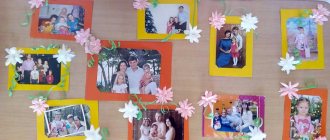Proper nutrition is the key to a preschooler’s health
Bibliographic description:
Rumyantseva, T. A. Proper nutrition is the key to the health of a preschooler / T. A. Rumyantseva, A. Yu. Dengina, N. V. Ryadinskaya. — Text: immediate // Pedagogy: traditions and innovations: materials of the IX International. scientific conf. (Kazan, January 2022). — Kazan: Buk, 2018. — pp. 29-31. — URL: https://moluch.ru/conf/ped/archive/274/13573/ (access date: 01/25/2022).
This article is devoted to the topic of rational consumption of food and its role in the body system of preschool children. In the modern world, it is especially important to eat right. The article presents an analysis of emerging and possible problems in the nutrition of preschool children that parents and preschool educational institutions face. The health of children and the full development of their body largely depend on proper nutrition. The article addresses the following questions: “What is the proper nutrition system in kindergarten”; “What is meant by proper nutrition and what it should be like for preschoolers”; “What to look for when organizing meals for preschool children”; “What products are preferred when organizing meals?” Forms of work with parents are formulated and recommendations on children’s nutrition are given.
Key words: preschool children, health, proper nutrition, menu, body, immune system.
Health is the main value of human life. Every child wants to be strong, cheerful, energetic: to run without getting tired, ride a bike, swim, play with the kids in the yard, and not suffer from headaches and endless runny noses. Poor health and illness are the causes of stunted growth and general development of the child’s body. Therefore, everyone should think about their health, know their body, learn to take care of it, and not harm their body.
The task of the kindergarten and family is to preserve and strengthen the child’s health, an important component of which is proper nutrition. It must be taken care of from early childhood to ensure normal growth and development of the body, promote disease prevention, and resistance to infections. Lack of vitamins and microelements in food, as well as harmful components of some modern products produced by unscrupulous manufacturers, negatively affect the physical development of children, which contributes to a decrease in immunity, the body’s resistance to disease, and the development of chronic diseases. The problem of developing children’s initial ideas about a healthy lifestyle and nutritional culture is a relevant aspect in the work of preschool teachers. Often adults theoretically understand the importance of expanding a child’s ideas about rational nutrition (the amount of food, the sequence of its intake, variety in diet, drinking regime), but in practice they act differently, faced with many objective and subjective problems. This contradictory behavior of adults does not contribute to the health of children. Increasing the competencies of parents in this matter is a necessary link in the general interaction of adults raising a preschooler. The development of proper nutrition skills should take place in the “teacher-child-parent” system. To form in children at the stage of completing preschool education a value-based attitude towards a healthy lifestyle and proper nutrition is the target of preschool institutions. To achieve this goal, the following tasks were formulated: to study the problems of organizing proper nutrition; formulate healthy eating rules with children; to form a culture of food intake and nutrition in children; increase the competencies of parents in organizing nutrition for preschoolers by participating in joint activities; create a magazine in kindergarten for children and their parents “Be Healthy!”
Children's nutrition has always been of interest to scientists, teachers and psychologists, who paid great attention to this problem. The nutritional characteristics of preschool children were studied by V.A. Kvitkovskaya, O.A. Matalygina, N.Yu. Minina, N.A. Stashevskaya and others. A.S. Alekseeva, V.G Alyamovskaya, I.Ya Kon, M.V Leshchenko in their works considered the issues of organizing rational and balanced nutrition for children in preschool educational institutions. A. S. Alekseeva argued that the health status of an adult largely depends on the proper organization of nutrition in childhood. According to O. A. Motalygina, a child 6–7 years old should and can independently evaluate his nutrition, if adults help him. The most important task of adults is to develop in children certain knowledge in the field of nutrition, which will further help maintain the child’s health. In order to increase and preserve the health of a child, the most important task of adults is to develop certain knowledge in the field of nutrition. Teachers and parents lay the foundation for proper nutrition for children, which is closely related to the culture of children’s behavior at the table. Educators and parents must teach children cultural and hygienic skills and proper behavior at the table. It is important to pay attention to the child’s posture when eating, the culture of eating, and cultural and hygienic rules associated with eating. It is important that during meals, teachers and staff are calm, not fussy, and always maintain a good mood in children. For example, use the following phrases: “How delicious the cutlets smell!”, “How beautifully the dish was served today!”, “What a delicious soup!” The table setting, pleasant smell and appearance of the served dish arouse children's appetite. During meals, pleasant, quiet music may be played.
It's no secret that children love chewing gum, lollipops, and sweet carbonated drinks, which is harmful to their health. Conversations with parents do not always produce the desired results. Teachers conducted a survey of parents, which revealed a number of problems: insufficient compliance by family members with the norms of proper nutrition and food intake culture; children do not always follow table manners, do not know the names of dishes well, and do not have enough cutlery. This led to the conclusion that insufficient attention is paid to the formation of a culture of proper nutrition in family education. And the idea arose for the project “We always need healthy food in life.” The parents of the students supported this idea.
The goal of the project was formulated as follows: “Formation in preschool children and their parents of ideas about the need to take care of their health, about the importance of proper nutrition as an integral part of maintaining and promoting health.” The objectives of the project were: to form in children the concept of proper nutrition; expand children's knowledge about healthy foods; teach children food culture; contribute to improving the culture of eating behavior in the family; improve parents’ understanding of the importance and significance of proper nutrition for the child’s health and their own health; involve children and their parents in joint activities to study a healthy lifestyle, food hygiene, principles of food safety and quality.
The organizational stage included: choosing methods and techniques for working with children to implement the project; study of methodological literature; organization of a developing subject-spatial environment: creation of an information stand in the group “How to diversify the nutrition of preschool children”; production and design of didactic, board and printed games and manuals, attributes for role-playing games; organizing cooperation with parents, developing individual conversations “Proper nutrition of a child” and questionnaires for parents.
At the main stage, activities were carried out in game centers: didactic games were held: “Preparing a salad”, “Cooking a compote”, “Guess by the smell”, “Guess by the taste”, “We need different porridges”, which contributed to the children’s acquaintance with the features of cooking, role-playing games “Come to visit us”, “Our family dinner”, “Shop of tasty and healthy products”; training in outdoor and speech games; educational games-activities, excursions, leisure, entertainment “Visiting Aibolit”; experimental activities; reading fiction, learning games, poetry; productive activity. For parents, we created a corner on the theme “Healthy nutrition for children.” The teachers organized an exhibition of creative works by children together with their parents, “Decorating my favorite dish”, “Vitamins on the table”.
The final event of the final stage was the entertainment “Proper nutrition is the key to children’s health” and the design of the magazine “Be Healthy!”
As a result of the project activities, all participants in the educational process showed creative activity, the children’s level of knowledge on this topic increased, the basics of behavior at the table, and a culture of proper nutrition were formed. Work on the project contributed to the development of a sustainable interest among children in preserving their health, the rules of proper nutrition were established, children learned to distinguish between healthy and unhealthy foods, learned a lot about the vitamins found in vegetables and fruits, and the benefits of porridge. Parents were involved in projects, participated in an exhibition of drawings, made albums, posters, and took part in entertainment evenings. Parents' interest in proper nutrition and a healthy lifestyle for children has increased. The systematic, systematic and joint influence of factors such as family, kindergarten, immediate environment, combined into one educational system, makes it possible to instill in a child a conscious attitude towards his health. In our kindergarten, it has become a tradition to hold a photo competition “Cooking with Mom!” on Mother’s Day. Parents and children conduct a presentation of dishes, during which they talk about the benefits of certain products and dishes. Proper nutrition should be regular, varied, adequate, safe and enjoyable. The group formulated rules for proper nutrition of children: before eating, wash your hands with soap; take food in small portions; while eating, do not knock your feet; eat carefully, don’t litter, don’t play with food; sit up straight; use cutlery correctly; use a napkin; thank you for the food.
As a result of the work carried out by teachers and parents of pupils, the children’s attitude towards some dishes that they previously did not like has changed. Children learned to choose healthy products and take responsibility for their health. The information provided to parents helped them review the family menu and evaluate the benefits of dairy, vegetable and fruit dishes for children. Many parents have realized that properly organized nutrition provides children with the necessary vitamins and increases the body’s resistance to harmful factors and infections.
Systematic, systematic, purposeful activities of the entire team helped to achieve positive results, parental competence and interest in the issues of healthy nutrition for children increased. Parents began to pay more attention to the variety and fortification of dishes.
Literature:
- Kolesnikova S.A. Requirements for the organization of nutrition for preschoolers // Preschool pedagogy.-2002. — No. 5.- p.4
- Kozhevnikova N. G. Nutrition of children in kindergarten. - 1981. - pp. 7–12
- Galaeva G. Klimova Yu. Conversation about proper nutrition // Engagement.-2002.- No. 5.- p. 17
- Catering in preschool educational institutions // Preschool education. - 2000. - No. 1. - p. 88–92
- Gumenyuk E. I., Slisenko N. A. “Proper nutrition of preschool children.”
- Konyaeva L. “Be healthy, baby” (Preschool education No. 11, 2004)
- Makhoneva M. “Raising a healthy child” (Preschool education No. 6, 2002)
- Matalygina O. A. All about the nutrition of preschool children / 2009.- 272 p.
- Alekseeva A. S. Organization of nutrition for children in a preschool institution, a manual for kindergarten teachers / A. S. Alekseeva, L. V. Druzhinina, K. Ladodo. - M.: Education, 1990.-210 p.
Key terms
(automatically generated)
: proper nutrition, child, kindergarten, parent, preschool age, healthy lifestyle, health, meal time, healthy eating, proper nutrition for children.
Project work “Eat right - stay healthy!”
Project type : information and research.
Duration : September - May 2018-2019 Long-term.
Project participants : teacher and children of the preparatory group, their parents, cooks and health workers of the educational institution.
Security:
Material and technical: photographs of families of pupils , paper (colored paper, colored cardboard, glue, Whatman paper), illustrations on the topic.
Information: camera, video camera, audio recordings, computer, multimedia projector, videos.
Educational and methodological: Methodological manual for teachers “Talk about health and proper nutrition” Bezrukikh, M. M., Makeeva, A. G., Filippova, T. A.; For working with preschoolers and primary schoolchildren aged 6-8 years: Workbook “Talking about health and proper nutrition”, information materials for parents, a set of posters.
Relevance: Preschool childhood is a unique period in a person’s life. It is at this time that health is formed. We want to see our children healthy and happy. It is very important today to develop motives, concepts, and beliefs in preschool children about the need to preserve and strengthen their health. Rational nutrition is one of the environmental factors that determine the normal development of a child, and therefore it is especially important to be able to properly organize your nutrition. These skills are most easily developed in childhood. It is during this period that the foundations for a healthy organization of the child’s life for the future are laid. Today there is a problem of proper nutrition in the family. Many parents lack theoretical knowledge about proper nutrition. Many families are accustomed to eating salty, fried, sweet foods, neglecting dairy products. And therefore, children who are not accustomed to healthy food refuse vegetable dishes, fish, casseroles, and fermented milk products in kindergarten. But we all know that proper nutrition is the key to good health, active activity, excellent mood, the most important condition for our health and longevity.
Every day it is necessary to find words and examples that reveal to the child the benefits (or harm) of a particular dish or product. It is important to give children ideas about healthy food, vitamins and their benefits for human health, and nutritional culture.
The goal of the project: to form ideas among children and parents about healthy eating, about harmful and healthy foods, to create conditions for the development of knowledge of children and their parents about the rules of proper nutrition.
Project objectives : To expand children's knowledge about healthy and unhealthy foods. To develop in children an interest and willingness to follow the rules of rational and healthy nutrition; consolidate children's knowledge of table manners during meals. Promote the development of children's creative abilities.
For parents: to enhance parents’ knowledge about healthy eating, to increase their self-education on the topic. To develop the readiness of parents to cooperate with teachers.
The basis of the project activity is the “Talk about Proper Nutrition” program, developed by employees of the Institute of Developmental Physiology of the Russian Academy of Education on the initiative, under the leadership of Academician of the Russian Academy of Education M. M. Bezrukikh. The content of the program is based on Russian culinary traditions and has a strictly scientific basis. The Institute of Nutrition of the Russian Academy of Medical Sciences provides consulting support to the program.
Project “Eat right – stay healthy!” involves the use of various forms of conducting classes with children. Since play is the leading activity for preschoolers, game methods are predominantly used as the basis for organizing training in the program.
Educational activities within the project are carried out during scheduled moments; during children’s independent activities; is included in direct educational activities; when conducting outdoor, didactic, role-playing games; in experimentation and experimental activities. In the process of implementing the project, children will learn about the importance of following a diet, the main nutrients that make up food, healthy foods and dishes, the basics of a diet, hygiene rules, learn how to set a table and follow the rules of etiquette, as well as traditions and culinary customs, both their own country and other countries.
Plan of methodological work for program implementation
"Talk about proper nutrition"
in the preparatory school group "Zvukovichki"
in a municipal budgetary preschool educational institution
“Kindergarten No. 11 combined type “Katyusha”, Vorkuta
01.09.2018 — 30.05.2019
| No. | date | Names of events | Form of the event |
| 1 | September October | Questioning parents “Does your child eat right?” Conversation with parents “Introduction to the program “Talk about proper nutrition” | Parent meeting Conversation |
| September | “If you want to be healthy>” (Topic 1) Conversation “Culture of behavior at the table.” Role-playing games “Cafe”, “Dining Room”, | Games Conversations Activities | |
| 2 | October | Thematic week “Vegetables. Fruits "Vegetables, berries and fruits - vitamin products" (Topic 14) | Games Conversations Activities |
| 3 | October | Autumn Festival “How Carrots were given in marriage!” | Leisure activity |
| Excursion to the catering unit. Interview with the cooks of the preschool institution | Together with preschool employees | ||
| 4 | October November | The healthiest foods (Topic 2) Conversation “What does our food consist of? | Games Conversations Activities |
| 5 | November | “Open Day” (tasting dishes in a preschool educational institution with parents) | Parent meeting |
| 6 | November December | View the presentation “Healthy foods and vitamins” NOD “Bread is the head of everything” Lunch is bad if there is no bread (Topic 7) | Games Conversations Activities |
| 7 | December | Creation of the book “Preschool Children’s Favorite Recipes” | Together with the families of the pupils |
| 8 | December - January | Conversation with children: “What is a healthy diet”, “Harmful and healthy foods”, “Diet regime”. | Games Conversations Activities |
| 9 | January | Thematic week “Food” Riddles about food. Reading fiction. Folk wisdom about nutrition (proverbs and sayings about products, food, hospitality). | Games Conversations Activities |
| 10 | February | Photo competition with recipes (family traditions) | Together with the families of the pupils |
| 11 | January February | Research activity: “Where should food be stored so that it does not spoil?” | Experiments |
| 12 | February March | Who knows how to live by the clock (Topic 4) Drawing: “My lunch”, “These healthy fruits” | Games Conversations Activities |
| 13 | March | NOD “Proper nutrition is the key to health” | Open lesson for parents |
| 14 | March, April | Creation of the album “Vitamins” How to quench your thirst (Topic 12) Review of encyclopedias: “My health”, “Human body” | Collaborative activities between teachers and children |
| 15 | April | What is porridge made from and how to make porridge tasty (Topic 6) Quiz for children on fairy tales about food. Game “Help Cinderella” (separate the cereals) | Games Conversations Activities |
| 16 | May | Round table “How to keep your child healthy” | Parent meeting |
Work to implement the project was carried out in several stages. At the first stage of work, “Preparatory,” I set goals for studying the program “Conversation about health and proper nutrition” (Bezrukikh, M. M., Makeeva, A. G., Filippova, T. A.), and special literature on the organization healthy nutrition for children. A survey of parents was conducted to study the use of proper nutrition in the families of pupils, consultations on the basics of proper nutrition. A long-term plan for working with senior preschoolers and their parents has been drawn up. Dividing children into groups.
At the second stage, “Technological,” methodological support for the implementation of this project was selected: methodological materials for games, classes, conversations, experiments and productive activities, video materials (www.prav-pit.ru/teachers/materials). Didactic games, demonstration and handout materials were produced and purchased (using the “constructor” site www.prav-pit.ru/teachers/materials/constructor). The subject-developmental environment of the groups was transformed, the long-term calendar work plan was finalized, lesson notes, holiday and entertainment scenarios were developed. Recommendations and consultations on the organization of rational nutrition in the families of pupils have been compiled.
At the third stage, “Practical,” work continued on the implementation of the project “Talk about proper nutrition” in preschool educational institutions. Particular attention was paid to finding effective methods of working with parents of pupils.
Directions of work of MBDOU "Kindergarten No. 11" with parents of pupils
| Direction of work | Form and method of work | Goals and objectives |
| Information and analytical | Questioning. Interview. Observations | Identifying the interests, needs, requests of parents, the level of their pedagogical literacy on the issues of proper nutrition of preschool children. Collection, processing and use of data about the family of each pupil, the general cultural level of his parents, whether they have the necessary pedagogical knowledge, the family’s attitude towards the child, the parents’ needs for psychological and pedagogical information. |
| Cognitive | Pedagogical living room, oral pedagogical journals, mobile folders, consultations, booklets, competitions. | Familiarization of parents with the nutritional habits of preschool children. Formation of practical skills among parents in raising a healthy lifestyle for children. |
| Visual – informational (introductory) | An open day with food tasting, a tour of the catering unit, meetings in a non-traditional format, viewing classes and other activities for children. | Formation of knowledge among parents about healthy nutrition of preschool children. Familiarizing parents with the work of the kindergarten in organizing rational nutrition for children, with methods and techniques of education, and providing assistance to families in solving emerging problems. |
| Organization of joint activities of parents and children | Participation of parents and children in photo exhibitions, poster, drawing and craft competitions. Holding joint holidays. | Establishing emotional and trusting relationships between teachers, parents and children. |
At this stage, project activities continue, but the result and effectiveness of the work can already be noted. This is confirmed by children's knowledge on this topic. When conducting didactic games, observations and conversations, the children showed the effectiveness of the work done with them: their knowledge of the variety of healthy foods, the beneficial properties of vegetables and fruits, and healthy and unhealthy foods increased. The children learned to apply table setting rules while on duty. Joint creative tasks for children and parents (drawing competitions, photo exhibitions) helped strengthen relationships in families. Parents of students noted that children not only talk about the knowledge they have acquired in class, but also use it in life. After carrying out the events planned with parents, it became noticeable that in all families the attitude towards children’s nutrition had changed, parents began to adhere to the basic rules of rational and healthy nutrition.
Principles of baby nutrition
Not all dishes
eaten not only by his parents, but even by older brothers and sisters are suitable for preschoolers to eat.
The menu of a small child consists of more easily digestible foods, prepared taking into account the delicate and still immature digestive system. Also, young children have a different need for the energy value of food. To organize proper nutrition for preschoolers, parents should be guided by the following principles: - adequate energy value, - balance of nutritional factors, - adherence to diet. The table should have varied and tasty food, prepared in compliance with sanitary standards. The diet of a child from three to seven years old
necessarily contains meat, fish, dairy products, pasta, cereals, bread, as well as vegetables and fruits. At least three quarters of the diet should be warm and hot food.




